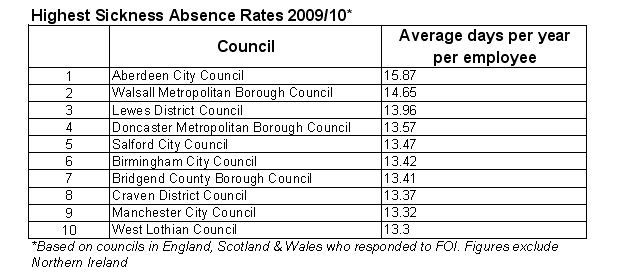Council spending reveals money mismanagement
 Siobhan Kennedy
Washington Correspondent
Siobhan Kennedy
Washington Correspondent
Exclusive: As Channel 4 News reveals the true scale of local authority spending, Siobhan Kennedy asks whether instead of cutting councils loose, the government should be reining them in.
Much has been made of the waste in central Government in the run up to last month’s drastic spending review.
But there’s been very little spotlight shone on the activities of local government. Yes, we are all now aware of the fact that many council chief executives are paid more than the prime minister.
But how much do we really know about the intricacies of what they spend our money on?
Working in conjunction with the Bureau of Investigative Journalism, Channel 4 News wanted to find out. What we embarked upon is the most comprehensive study of council spending ever undertaken.
The results, highlighted online and in a special report on Channel 4 News tonight, are both shocking and troublesome.
Council spending revealed ahead of cuts
Councils spend millions on sick days, redundancy payouts, and incentives to get staff to come to work including fruit baskets and M&S vouchers. Read the Channel 4 News exclusive here.
Spending
They reveal a culture of rampant and unchecked spending, indicative of the boom times. But councils’ excesses are potentially more worrying than their equivalent in the private sector precisely because they are not the private sector. Councils are spending our money. And now we know what they spend it on.
The list would be comical if it weren’t so depressing. Trips to twinned towns that just happen to be the champagne capital of France; jaunts to Barcelona for the national volleyball competition; or jollies to Quebec for the even more important mini-trampolining competition. Multimillion pound car budgets from a council that at the same time tells its residents not to buy new cars. And private healthcare for council employees that should, by all rights, be happy with the NHS just like the rest of us.

To be fair, council’s have always had a bad reputation when it comes to money management. They’re known as wasteful, often dysfunctional institutions, and many are working hard to change that culture.
The requirement, for example, for councils to list any item of spending above £500 online, will no doubt force many to be more accountable. But the details revealed by our Freedom of Information searches are nonetheless an eye-opener because they show how widespread and endemic the problem is.
Culture of illness
What is much more worrying though, is the results our research has thrown up about a much bigger problem: sickness.
While it’s in council’s behest to stop sending executives to mini-trampolining events, it’s much more difficult to undo an entrenched culture of illness that has its claws deeply embedded.

The data says it all. The average council worker takes off nearly twice as many sick days as his or her private sector counterpart. In Aberdeen, the sickness hotspot, the average worker takes off nearly 16 days a year due to sickness. On average, councils lost 9.4 days per employee in 2009/10 compared with an average 5.8 days in the private sector.
It’s not clear exactly why council workers are so much more sick than others. But travelling up and down the country and talking to several council leaders and chief executives, what is clear is that they don’t really know either.
Stress
Many of them point to genuine sickness problems – though why the bad weather in Aberdeen and North Wales should affect workers there disproportionately compared to the rest of us (who by the way also had to endure a pretty miserable winter last year) is unclear. It’s a reason for some absence, for sure, but for such high numbers?
It’s more likely that there is, as the unions report, a big element of stress. Particularly in Aberdeen’s case, where council workers have endured years of cost cutting, restructuring and turmoil.
After speaking to the chief executive there, Sue Bruce, you were at least left with the impression she was a woman who was in charge, understood the problem and was working on ways of tackling it. The same can not be said for Conwy in North Wales, however, where I was left with the distinct feeling that officials didn’t really seem to have a grip on what the sickness absence numbers were, let alone how to bring them down.
Sickness costs
The problem for Ms Bruce, and others like her, is that with the cuts looming – they will have a third less money to spend from central Government – council workers will be even more stressed and that could, if unmanaged, lead to higher rates of absenteeism. And that costs.
In Aberdeen’s case, as much as £5m is already wasted each year paying workers to be off sick and paying agency staff to replace them. With £127m of “savings” to be found, Aberdeen can’t afford for that bill to get any higher.
And speaking of savings, we all know the biggest way of saving money is to cut staff. And here’s where our research shows councils have another big problem.

Redundancy
Some 30,000 council employees have been laid off since 2007, but it’s a saving that has come with its own price – almost half a billion pounds, in fact.
The Local Government Association says that town halls have put cash into reserves to pay for this outlay. But chief executive John Ransford told me he is worried that some small councils won’t be able to make the level of redundancies demanded of them.
Some will be forced to ask the government for special dispensation to effectively borrow against their capital budgets. And these aren’t small sums we’re talking. With estimates of job losses at anything up to and above 100,000 staff, the overall bill could be as high as £1bn, or more.
It’s true that the redundancies will be spread out over a number of years, but given the extent of the cuts, it seems inevitable that services will have to drastically cut to help pay for the layoffs.
At a time when central government’s turning to a crack team of experts including Philip Green for help on how to make its own cuts, councils are being cast adrift – receiving less money but a lot more freedom on how to spend it.
Given the problems our investigation has thrown up with how some town halls manage their finances, it’s hard not to wonder whether instead of cutting councils loose, the government should be looking at how to rein them in.

-
Latest news
-
Yungblud launches his own affordable music festival5m

-
Why these Americans want to quit their state9m

-
Company behind infected water outbreak are ‘incompetent’ says local MP5m

-
Israeli forces push deeper into Northern and Southern Gaza4m

-
India’s ‘YouTube election’: Influencers enlisted to mobilise youth vote6m

-




